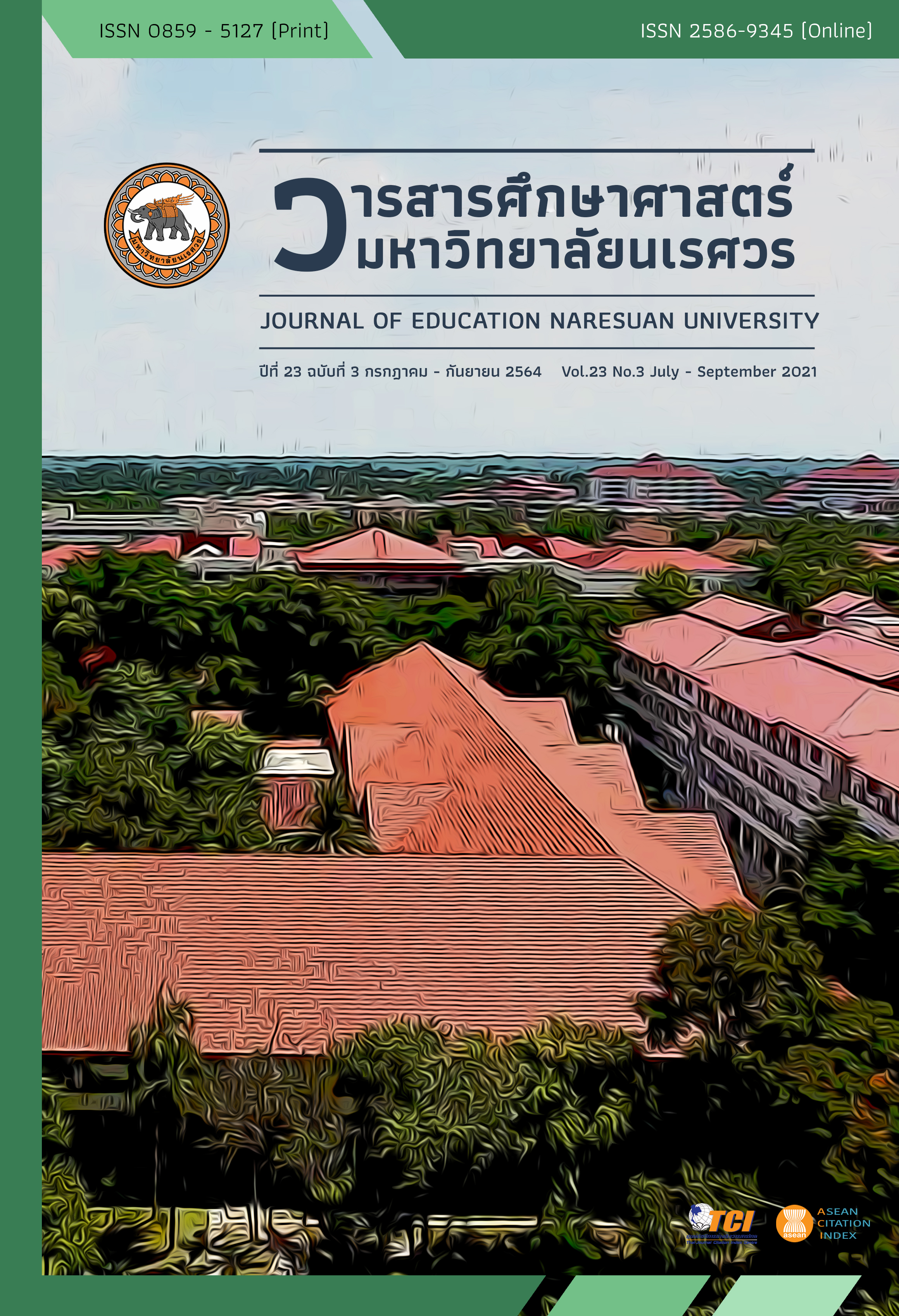THE LEARNING OUTCOME USING BRAIN-BASED LEARNING AND SCAFFOLDING STRATEGY FOR DEVELOPING ENGLISH READING COMPREHENSION SKILLS OF PRATHOMSUKSA 6 STUDENTS ผลการจัดการเรียนรู้โดยใช้แนวคิดการเรียนรู้แบบใช้สมองเป็นฐาน (BBL) ร่วมกับกลวิธีเสริมต่อการเรียนรู้เพื่อพัฒนาทักษะการอ่านจับใจความภาษาอังกฤษ ของนักเรียนชั้นประถมศึกษาปีที่ 6
Main Article Content
Abstract
The purposes of this research were 1)to compare English reading comprehension skills after learning with Brain-Based Learning and Scaffolding Strategy. 2) To compare English reading comprehension skills between learning by Brain-Based Learning and Scaffolding Strategy and the conventional teaching group. 3) To study the satisfaction of students on learning by using the Brain-Based Learning and Scaffolding Strategy. The samples were students in Prathomsuksa 6 of Anubanwatklangdonmauangchonburi School, Chonburi province. An experimental group consisted of 31 students and 31 students of a control group, selected by cluster random sampling method. The experiment took 12 sessions. The instruments were lesson plans using Brain-Based Learning and Scaffolding Strategy, conventional teaching lesson plans, an English reading comprehension test, and students satisfaction questionnaire was developed to ask of students. The statistics used for data analysis were mean, standard deviation, and t-test. The results of the study were as follows:
1. The learning outcome of Prathomsuksa 6 students using Brain-Based Learning and Scaffolding Strategy found that the posttest scores were significantly higher than the pre-test scores at the .01 level of significance.
2. The learning outcome of Prathomsuksa 6 students using Brain-Based Learning and Scaffolding Strategy found that the posttest scores were higher than the posttest scores of a control group at the .01 level of significance.
3. The level of satisfaction of the students who studied with the Brain-Based Learning and Scaffolding Strategy was at the highest level of satisfaction.
Article Details
The owner of the article does not copy or violate any of its copyright. If any copyright infringement occurs or prosecution, in any case, the Editorial Board is not involved in all the rights to the owner of the article to be performed.
References
Aneksuk, S. (2016). Educational research. Chonburi: The Faculty of Education, Burapha University. [in Thai]
Applebee, A. N., & Langer, J. A. (1983). Instructional Scaffolding: Reading and Writing as Natural Language Activities. Language arts, 60(2), 168-75.
Beed, P., Hawkins, M., & Roller, C. (1991) Moving learners towards independence: The power of scaffolded instruction. The Reading Teacher, 44(9), 648–655.
Boonsompan, O. (2008). The learning activity using brain-based learning for stimulating the knowledge in vocabulary and the ability of english reading for prathomsuksa 3 students (Master thesis). Chiang Mai: Chiang Mai University. [in Thai]
Bureau of Academic Affairs and Educational Standards. (2011). The development approach and assessment of read, think, analyze, write through basic education curriculum 2008. Bangkok: The Agricultural Cooperative Federation of Thailand. [in Thai]
Caine, R. N., & Caine. G. (1990). Understanding a brain based approach to learning and teaching. Educational Leadership, 48, 66-70.
Caine, R. N., & Caine. G. (1994). Making connections: Teaching and the Human Brain. Menlo Park, Calif.: Addison-Wesley.
Chomrung, N. (2009). The outcome of reading comprehension for mattayomsuksa 2 students among brain-based learning with conventional activity (Independent study). Maha Sarakham: Mahasarakham University. [in Thai]
Dailynews. (2017.) More than half of the result of the o-net in the only Thai language. Retrieved October 15, 2017, from https://www.dailynews.co.th/education/563023 [in Thai]
Graves, M, Graves, R., & Braaten. S, (1996). Scaffolding reading experience for Inclusive classes. Educational Leadership, 53(5), 14-16.
Hoge, P. (2003). The integration of brain-based learning and literacy acquisition. New York: W.H. Freeman and Company.
Khanthap, C., & Bhiasiri, S. (2012). The development of English reading skill by using brain-based learning of grade 4 Students. Journal of Education Khon Kaen University, 35(3), 9-14. [in Thai]
Lerdwicha, P. (2009). Teaching Thai though brain – based learning approach (2nd ed.). Bangkok: The Agricultural Cooperative Federation of Thailand. [in Thai]
Lerdwicha, P. (2010). Manuel of school quality assurance through BBL school model. Chiang Mai: Tarnpanya. [in Thai]
Lerdwicha, P. (2012). Thai teaching lessons plan of early elementary school according child brain development. Chiang Mai: Tarnpanya. [in Thai]
Lipscomb, L., Swanson, J., & West, A. (2004). Scaffolding. Emerging perspectives on learning, teaching, and technology. Retrieved October 15, 2017, from http://www.coe.uga.edu/epltt/scaffolding.htm
Ministry of Education. (2015). Basic Education Curriculum 2008. Retrieved October 10, 2016, from http://math.ipst.ac.th/wpcontent/uploads/2015/PDF/Course%202551.pdf [in Thai]
Mongkonchu, W. (2007). The learning outcome of Thai reading comprehension using student – centered learning activity through brain-based learning in mattayomsuksa 3 (Independent study). Maha Sarakham: Mahasarakham University. [in Thai]
Pansue, S. (2008). Use of scaffolding strategies to promote writing ability and decrease writing anxiety of expanding level students (Master thesis). Chiang Mai: Chiang Mai University. [in Thai]
Sanhachawee, A. (2011). Learning theory for parents, teachers and administrator. Bangkok: Suweeriyasarn. [in Thai]
Srisa-ard, B. (2010). Basic of research (8th ed.). Bangkok: Suweeriyasarn. [in Thai]
Tachang, M. (2011). Teaching reading comprehension through brain-based learning approach effect on the ability of the writing summary for prathomsuksa 3 students (Master thesis). Chiang Mai: Chiang Mai University. [in Thai]
Unokphan, J., Suksai, P., & Onthanee, A. (2018). A development of brain-based learning activities to enhance English communication ability and happiness in learning for grade 6 students. Journal of Education Naresuan University, 20(3), 35-48. [in Thai]
Vygoysky, L. S. (1978). Mind in society. Cambridge, MA: Harvard University Press.
Wongwikan, P. (2017). Effect of teaching according to the brain - based learning approach on reading comprehension ability and satisfaction on Thai subject of prathomsuksa 2 students (Master thesis). Nakhon Sawan: Nakhon Sawan Rajabhat University. [in Thai]


